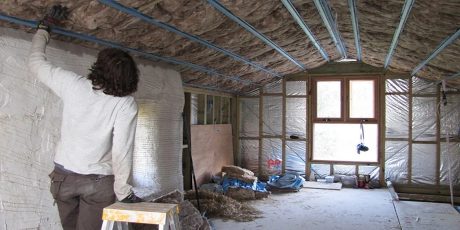5 radical ways the Government can tackle climate change 26 Jan 2022

Opinion: if the Government is serious about its hugely ambitious Climate Action Plan, it will have to try things that have not been tried before - Dr. Paul Deane, Senior Research Fellow, MaREI Centre, Energy Policy & Modelling Group, Environmental Research Institute, UCC
Ireland has one of the world's most ambitious plans to tackle climate change with a commitment to cut the emissions of planet warming gasses to the atmosphere in half by the end of this decade. It is a plan without precedence, and a feat that no modern economy has deliberately achieved in a peacetime period. The ambition reflects the urgency of international science to limit rising global temperatures, but also is making up for lost time where the past 30 years saw little in terms of lowering climate emissions across the Irish economy.
The Government's Climate Action Plan details numerous strategies on how to reduce these emissions and as one would imagine there is a big focus on renewables, electric vehicles and retrofitting homes. While the plan is remarkable in ambition, it still falls short of the required halving of emissions by 2030 and more sweeping measures are needed.
To do something that no country has achieved, the government will have to try things that have not been tried before. Here are five radical ways to deliver increased climate action that could be considered.
Only sell SUVs to people who really need them
Globally, SUVs are an environmental problem. If SUVs were an individual country, they would rank sixth in the world for absolute emissions in 2021. In Ireland we have seen a surge in petrol and diesel SUV sales, which leads to higher emissions and decreases the overall environmental benefit of sales of efficient smaller cars. This is because SUVs are heavier and consume around 20% more energy than a medium-sized car.
Governments in France and Germany have already started introducing measures, including a tax on large and high-emissions cars like SUVs. Limiting the sales of SUVs to those who need them, like farmers and construction professionals, would help reduce emissions from transport.
'Green’ public holidays
Ireland lags behind other European countries when it comes to the number of public holidays with 10 (including the new holiday announced yesterday) compared to 12 for other countries. Having new public holidays that specifically encourage local environmental activity such as less driving or free public transport would help reduce emissions. We have already seen from the pandemic that driving less can have a marked impact on emissions.
This is not a new concept. During the oil crisis in the 1970s, the Dutch government banned private motor vehicles on Sundays to curb oil consumption. This in part led to a culture of cycling which has endured today in the Netherlands
Introduce a carbon levy on meat
Eating healthier diets with less red meat is necessary to reduce national and global emissions from agriculture. We produce a lot of milk and meat in Ireland. Most of this is for export to other countries (where it is consumed), but the emissions are accounted for here.
he environmental footprint of Irish produce is good when compared to other EU countries, but the challenge is that about one-third of Ireland’s emissions come from agriculture, with a large portion of that coming from cattle alone
An environmental levy on meat monetises the environmental damage associated with its production and at today’s carbon tax would add approximately 0.80€ to a kg of meat. The measure is not likely to significantly reduce consumption in Ireland, but the benefit of such a levy would be to recycle the revenue raised back into rural Ireland to help families move to more sustainable practices
Introduce new technologies to remove emissions
Climate science is clear that not only do we need to reduce emissions, but we also need to remove emissions from the atmosphere and store them safely underground. One way to do this is by planting quick growing energy crops like willow in Ireland which absorb emissions from the atmosphere. These would then be burned as fuel in power plants but, ithe emissions would be captured rather than released into the atmosphere and put into geological storage such as in old gas fields in Ireland or abroad.
The technology exists, but it's expensive. An agricultural land area similar to what we use for planting spring barley today would also be required to remove 2 million tonnes of emissions from the atmosphere. This impact would be like taking one million cars off the road and is significant.
Provide linked finance for retrofitting
Most existing homes in Ireland will require some form of retrofitting or increased insulation to reduce the amount of heat leakage, and fuel used to heat them. Putting adequate insulation or retrofitting your home is expensive and can have an upfront cost of over €20,000. This is outside the reach of most families when considering traditional financial paybacks of 10 to 15 years.
However, linking State-supplied loan repayments of the costs of retrofitting to the lifetime of the property (for example 100 years) rather than the person would give lower annual repayments over a longer time and make it more attractive. It is also fair because the benefit of the retrofit would be valid for the lifetime of the property. Ideas like this are already being trialled in other countries.
All these ideas are challenging, but some will be necessary if we are serious about our national climate responsibility.